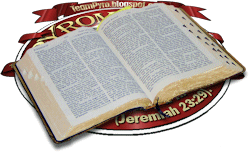 An aside
An aside: seriously, pastordude, studentdude — you really ought to read out of your own little parochial circles. Sure, many writers (
::cough::McLarenBellCampoloEtc
::cough::) may be a pure and utter waste of time, but you really should let your thinking be stretched and challenged among Biblically faithful, godly, deeply thoughtful writers.
Such as John Frame.
The accolades from men such as Carson, Piper, Mayhue, Pratt, and Kelly are well-deserved. J. I. Packer calls the volume both "magisterial" (xxiii) and "pastoral" (xxiv) in the Foreword, and both are appropriate.
Let's take an
overview. Imagine this — a book
on Scripture that begins with two pages of
Scripture lauding the excellencies of
Scripture, which then is crowned by the simple profundity of the well-known song that begins, "Jesus loves me, this I know,
For the Bible tells me so."
Then Frame provides a ten-page outline of the entire book, minus appendices (xiii-xxii). This is a helpful aid in keeping the shape of the forest in mind, whilst wandering amid the trees Prof. Frame points out for us. It is a singular feature; more authors should follow suit.
The next actually caught me by surprise. In the Table of Contents, one notices that Frame provides appendices.
A lot of appendices. They run the alphabet from A to Q. How much of the book does that end up involving? This much:
That's right: on the left is the text, on the right, the rest. In a 684-page book, the text ends on p. 334. The rest is comprised of appendices, bibliography, and three indices. (No endnotes! Footnotes! Frame and P&R love and respect their readers!)
This is not a criticism, as the appendices provide worthwhile interaction with books, articles and movements, applying Frame's perspective to specifics such as issues of antithesis and rationality, charges of Biblicism, questions of the place of Christ and the Spirit, matters of worship and traditionalism, Dooyeweerdianism, and particular influential authors such as John Wenham, Peter Enns, and N. T. Wright.
As to the text itself, I was informed, challenged, and greatly helped. Several of Frame's insights had an impact on
the way I presented the word of God in my first sermon series at CBC.
For readers new to Frame, here's what you can expect: he is (I'd say) a brilliant man who constantly interacts with Scripture in a very lively, thoughtful, probing manner. He is deep, yet readable, and he's greatly helped me think through some issues.

My favorite Frame anecdote was actually supplied by a friend, who shared about his father visiting him at seminary. One of my friend's roommates asked his father, “Were you in the same class as John Frame?”
My friend's dad paused a moment, then responded, “No one was in the same class as John Frame.”
Back to the book.
Frame treats of Scripture's self-testimony well and at length. He identifies the "main contention" of his book thus:
God's speech to man is real speech. It is very much like one person speaking to another. God speaks so that we can understand him and respond appropriately. Appropriate responses are of many kinds: belief, obedience, affection, repentance, laughter, pain, sadness and so on. God's speech is often propositional: God's conveying information to us. But it is far more than that. It includes all the features, functions, beauty, and richness of language that we see in human communication, and more. ...My thesis is that God's word, in all its qualities and aspects, is a personal communication from him to us. (3)
He develops Scripture as necessarily evocative of a wide variety of responses as befitting the individual texts, including belief, obedience, delight, repentance mourning (4). Scripture has inherent authority, which he defines as a "capacity to create an obligation in the hearer" (5)
So in Scripture God speaks, He speaks to us, and He speaks as Lord. His word is authoritative, and we are obliged by a wide variety of genera to respond in a wide variety of ways. God's whole word engages the whole man.

Frame then moves to identify the shocking defection of scholars and (then) pastors
from that Biblical position. I've never seen a fresher, better analysis and representation of the Academy's betrayal. He says it began with the assertion of "intellectual autonomy" or "autonomous reasoning," with the corollary assumption that "anyone who disagreed was simply not a scholar, not qualified to do serious research" (19).
The effects of this seismic shift came quickly and suddenly into the church:
It all happened very quickly. There was no academic debate on whether it is right for human beings to exercise reason without the authority of God's revelation. There was not much argument about whether the universities should change their time-honored commitments to divine revelation. Rather, major figures simply began teaching from the new point of view, and there was no significant resistance. They accepted the assumption of autonomy and saw to it that their successors accepted it, too. ...The conservatives did not know what hit them. (19)
Further:
This change was astonishing. The adoption of intellectual autonomy as a theological principle was certainly at least as important as the church's adoption of the doctrine of the Trinity in 381, or the doctrine of the two natures of Christ in 451. Yet without any council, without any significant debate, much of the church during the period 1650 to the present came to adopt the principle of intellectual autonomy in place of the authority of God's personal words. But this new doctrine changed everything. Given intellectual autonomy, there is no reason to accept supernatural biblical teachings such as the doctrine of the Trinity and the two natures of Christ. The virgin birth, miracles, atonement, resurrection, and glorious return of Jesus are on this basis no longer defensible. (20)
One more:
...if human reason is autonomous, the God of the Bible does not exist, for his very nature as the Creator excludes the autonomy of his creatures. And in fact nothing at all can be validated by autonomous reason, for...such reasoning leads to a rationalist-irrationalist dialectic, which destroys all knowledge. For that pottage, much of the church has forsaken its birthright, God's personal word. (20)
The rest of the book proves this from Scripture, develops it, and applies it.
In the course of this feast, Frame deals with propositional truth, authority, inerrancy, sufficiency, transmission, and translations. Let me just single out two more favorite points from the book, and finish by (surprise) recommending it heartily.

Frame faces head-on the charge that, since we don't have the autographa, inerrancy is irrelevant. He explains that inerrancy does not adhere to
a particular sheet of papyrus, but to the
text written on that sheet. From this, he argues that, while we do not possess the autographic
manuscripts, we do indeed present the autographic (and therefore inerrant)
text of Scripture.
Quoting Greg Bahnsen with approval, Frame notes that the
autograph is "the first completed, personal, or approved transcription of a unique word-group composed by its author," certified by the author in some way, such as sending an epistle to a church (241). Again, "The autographic
text has been almost entirely preserved, accessible through manuscripts available to us and through the science of textual criticism" (252, emphasis original). What is more, "The distinctive
teaching of the Scriptures has been entirely preserved, given the beneficial redundancy of doctrinal teaching in Scripture" (ibid, emphasis original).
That thought was immensely helpful to me. The other particular emphasis that stayed with me is found throughout the book, not easily reducible to one quotation. It is that God is present to me (and to His people) in His word. In His word He draws near, He speaks personally, and He exercises His Lordship. Tis affects me as a Christian, and as a preacher of God's Word.
The only disappointment I had was in his chapter on the Canon (133-139). It isn't that Frame's work is not helpful; it is. But my unreasonable expectation was that Frame would answer all my questions, but instead he understandably notes that "The present volume cannot enter into the details of this debate," and since this volume "is a systematic theological treatment, not a historical study" (135), he doesn't get fully into the issue. I would say that in this, Frame is a victim of my high estimation of him.
John Frame's The Doctrine of the Word of God is a challenging, informative, forceful and helpful book. I highly recommend it.
NOTE: this book was provided by P&R as a review copy.










































